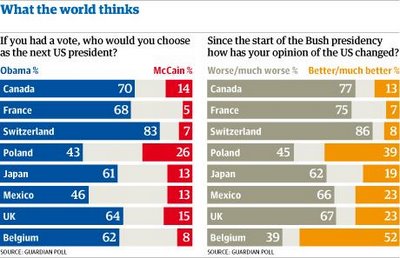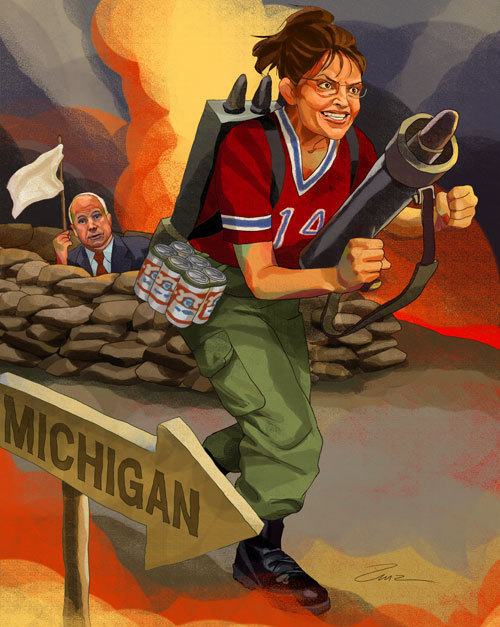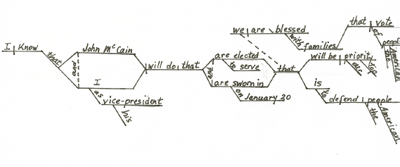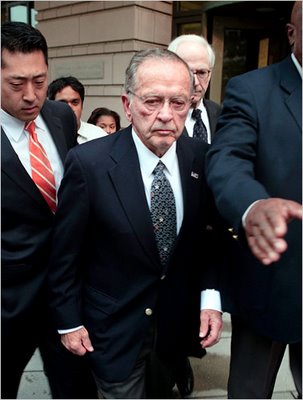Tuesday, October 28, 2008
Fiber is Cheaper: Verizon
Way back in one of the early-1990s stagings of PC Forum, Bell Atlantic CEO Ray Smith, struggling with the possibility that Interactive TV would fail, declared, "Fiber beats copper on truck rolls alone, even without a business model." I have not been able to find anything like Ray Smith's statement in any Google-able form, nevertheless I heard it with my own ears. Alas, I am also remembering it with my own mind.
Now, fortunately, we don't need my memory. We have current, real-world confirmation. According to Telephonyonline, Chuck Graff, director of corporate network and technology at Verizon, told yet another forum, the NEBS Forum, the same story. According to the Telephonyonline story,
Verizon’s FiOS deployment has enabled the company to reduce truck rolls associated with maintenance of copper phone lines. “Overall, we’ve seen a 39% savings in maintenance,” Graff said.Of course we don't know whether he's comparing old copper to new fiber, or looking at numbers shaped by deferred maintenance of copper, or citing annual versus lifetime cost, or summarizing the results of a statistically reasonable covariance study. What we do know is that a senior Verizon official said, "39% savings," in public. This is good news. Big news. Worth remembering when telcos and cablecos whine about how much it all costs.
A tip of the hat to Casey Lide at baller.com for spotting this story.
Technorati Tags: fiberoptics, FIOS, FTTH, Verizon
Monday, October 27, 2008
Pic>1kword: Ted Stevens
Thursday, October 23, 2008
Opie and da Fonz discuss the election
And here's Ron Howard's endorsement of Obama:
And here's Henry Winkler discussing the election:
Original posting:
[source] tip o' hat to BoingBoing . . .
Technorati Tags: BarackObama, Politics
McCain's Brother does a Billy Carter
Joe McCain Calls 911 To Complain About TrafficThen he calls again . . .
posted 4:57 pm Thu October 23, 2008
He called the police emergency line because he was angry he was stuck in traffic.
The 911 call came into the City of Alexandria on Oct. 21st That's creating some buzz because it appears to come from Joe McCain, John McCain's brother.
Operator: 911 state your emergency
Caller: It's not an emergency but do you know why on one side at the damn drawbridge of 95traffic is stopped for 15 minutes and yet traffic's coming the other way?
Operator: Sir, are you calling 911 to complain about traffic? (pause)
Caller: "(Expletive) you." (caller hangs up)
Appears to be Joe McCain: Somebody gave me this riot act about the violation of police.[source]
Operator: Did you just call 911 in reference to this?
Appears to be Joe McCain: Yeah.
Operator: 911 is to be used for emergencies only not just because you're sitting in traffic.
No further comment from isen.blog is necessary.
Technorati Tags: JohnMcCain
Bunkum from National Association of Broadcasters
Sorry, NAB, the FCC isn't here to protect the broadcasters. It is time to test this idea in the real world.
Technorati Tags: FCC, WirelessNetworks
Beyond white spaces
Broadband over Power Line (BPL), once touted as The Third Pipe, is another dud. DSL Reports just declared 2008 The Year BPL Died, citing tech problems, performance problems and market problems. BPL's flaws have been obvious for years to those whose salary doesn't depend on its success. Rahul Tongia's 2004 paper, Can Broadband Over Powerline Carrier Compete? should have been the last nail in its coffin. I blogged BPL-RIP in 2005, saying, "BPL is so crippled there's no 'disruptive' in it." The mistake persisted for years longer than it should have, supporting the myth that multi-modal competition is a substitute for national policy. Today all who look see that fiber rulz.
There's so many things a new technology needs to get right if it is to succeed. First it needs to be significantly better than what's out there already. It needs to be cheaper out of the gate. It needs to open up new markets and prove itself useful. It needs to achieve economies of scope and scale. It needs economics that won't strangle it in its crib.
White spaces, the FCC proceeding about using digital TV spectrum that's only lit in cities far away, strikes me as YARV, yet another risky venture. My friends at Google and the New America Foundation held a meeting on white spaces the other day. The title of the meeting, "Pervasive Connectivity," seems an over-reach without a systems approach that includes pervasive fiber and already-deployed wireless protocols, such as Wi-Fi and LTE. Who's going to build devices in such scale that they'll out price-performance Wi-Fi? Who's going to offer service that'll out-pervade the cellular network? And what about that one critical factor that every wireless network must consider, backhaul?
The white space idea is fraught with unsolved issues. In its first incarnation, its radios will only broadcast at 40 milliwatts, which raises doubts about any advantage it might have over Wi-Fi. (Meanwhile, Wi-Fi itself keeps improving.) One wireless data expert I know suspects that propagation characteristics around 300-400 MHz could cause major problems. Another expert I know, considering all the issues, suggests that white space may find its niche in under-served, e.g., rural, areas. Neither was heard at the "Pervasive Connectivity" meeting. Such views, no matter how correct, are problematic when specific policy change is the over-arching goal.
The FCC may or may not consider white space in its meeting on November 4, which conveniently falls on election day. Hey, the FCC was all for BPL. Indeed, the FCC absolutely should allow white space experiment to proceed; sins of commission, pun intended, are better than sins of omission, especially when they allow honest experimentation.
Google's strategy is an incremental, multi-frontal approach. That's OK, we need to make progress where we can. Even if the progress is limited to, "yet another experiment." But, in addition, there should be another effort, a big, synoptic plan, that rises above specific technologies and specific policy agendas, that uses all of the expertise available, to craft a comprehensive vision worthy of the moniker "Pervasive Connectivity."
Suppose in the next few months we get the opportunity to propose a real plan for Pervasive Connectivity for our nation, could we rise to the occasion? Or would we remain conditioned to the mindset of the last eight years, when small increments counted as great victories. Naomi Klein cites Milton Friedman's idea that in a nodal moment, the ideas implemented are the ideas lying around. Rick Perlstein, in an essay called, A Liberal Shock Doctrine, points out that even progressive progress occurs in spurts, at opportune times. We shouldn't limit our vision to one specific technology or one tactically available sliver of spectrum. Now is the time to have a comprehensive plan "lying around" for the network we really want.
Technorati Tags: Broadband, Bushco, DisruptiveTechnology, FCC, fiberoptics, Google, Infrastructure, Innovation, Organizational Culture, ShockDoctrine, WiFi, WirelessNetworks
Monday, October 20, 2008
Pic>1kword: How the world sees the U.S.
The figure erroneously reports Belgian sentiment. Thanks to Olivier, who pointed this out; see his comment. I suspect Olivier might be Belgian.
The Guardian says, "This article was amended on Tuesday October 21 2008. A graphic showing the results of a poll on how the US is viewed around the world reversed the findings for Belgium. We stated that 39% of Belgians polled said their opinion of the US had changed for the worse since the start of the Bush presidency, and 52% said it had changed for the better. Those figures should have been the other way round."

[Source]
Technorati Tags: BarackObama, Bushco, Global, JohnMcCain, Picture>1kwords, USLosingLead
Monday, October 13, 2008
Shuttle Driver Shares Nobel Work
Then I saw this story about former Woods Hole scientist Douglas Prasher, 57, who now drives the shuttle at the Huntsville, Alabama Toyota dealership for $10 an hour. Prasher did much of the groundbreaking work on the fluorescent protein that won the Prize for the other three. One of the named Nobel Laureates said, "[Prasher's] work was critical and essential for the work we did in our lab . . . They could've easily given the prize to Douglas and the other two and left me out."
Prasher, it turns out, isolated the gene for the glowing protein, then lost his grant, took a series of science jobs outside his field, and then his science career hit a dead end. Before he left, though, he passed his findings on to the people who Won The Prize. The story recounts this as an act of altruism, but I see it as normative science behavior, because despite all the accolades given to (and deserved by) the science equivalent of Yaz or Ted Williams or Babe Ruth, we Woods Holians, who see science done every day, know that it is a team sport.
I am sensitive. I've been deinstitutionalized for over a decade (except for a brief stint at the Berkman Center for Internet and Society). I prefer to work independently. Call it a personality flaw if you wish. But the fact is that my work is valued by my colleagues. However, when colleagues once-removed don't see Harvard or Bell Labs or the equivalent, they tend to discount it just a wee little bit. Thus my empathy with Prasher's story.
[Speaking of team sports, thanks to Jorge Ortiz, who found this Woods Hole story way down in Monterrey, Nuevo Leon, and called it to my attention!]
Technorati Tags: NobelPrize, Science, WoodsHole
Krugman wins Nobel!
Krugman blogs, "An interesting thing happened to me this morning . . . " Reuters story here.
I depend on Krugman's twice-weekly New York Times column to explain what the economics news of the day means. I've been following him closely for years. He's been a lone voice in the mainstream media -- for several years now -- explaining how the subprime bubble could end in disaster.
I can't imagine a more timely announcement. I'm not equipped to judge the technical aspects of his work at which the Prize was aimed. Now the Prize elevates Krugman from liberal pundit to sage. [Can you imagine Dowd or Kristol as Nobel Laureate?] The weight now added to Krugman's insights and advice will redound to the benefit all 7 billion of us. We've won!!!
Technorati Tags: Economics, NewYorkTimes, Press, NobelPrize
Friday, October 10, 2008
Understanding why Network Neutrality is Misunderstood
Now, let me declare right up front, Geoff is a great guy, and a true friend. He has the energy of any other half-dozen Internet activists. He organized the remarkable "Camp Fiber" gathering in Lafayette last Saturday, which I had the good fortune to attend. And he is ever-willing to engage forthrightly when we disagree. However, he's been traveling in close company with Bell heads and old-school network managers, and he's unconsciously adopted several of their core assumptions.
It is telling that Geoff was surprised that, in his own words, "It's not about filling the pipe." He writes:
"I went into Saturday's CampFiber in Lafayette with the belief that the primary topic of discussion would be how to fully utilize the 100Mbps intranet LUS subscribers will have access to, but then a funny thing happened: that wasn't what everyone else was interested in . . . figuring out what to do with 100Mbps was a secondary issue at best."In his previous post, Geoff spoke of the need for special mechanisms to allocate bandwidth for video-conferences and to throttle excessive P2P use. In Lafayette last weekend I explained that categorizing applications and distinguishing among different kinds of users destroys the very property that made the Internet the success that it is today -- its option value.
I think he heard. For example, he now notes that once fiber became available, Lafayette's library system's throughput grew, "from a few T-1s to 35Mbps over the last few years." This wouldn't have happened if bandwidth was scarce and priced accordingly. Also, he notices that even when developers aren't explicitly building big-bandwith apps,
. . . not having to worry about capacity constraints can free the minds of developers to worry less about compression and squeezing things down and more about the functionality, usability, and overall impact of their apps on improving society.Isaac Asimov observed that discoveries are more often heralded by, "That's funny . . . " rather than "Eureka!" I think Geoff's frank surprise, and his subsequent analysis, is evidence of an open mind.
Technorati Tags: Content-Conduit, End-to-End, FTTH, GeoffDaily, Infrastructure, LafayetteLA, NetworkNeutrality
Pic>1kword: The art of Zina Saunders


I've used these images only with the artist's permission.
By her request, I am delighted to declare that these pictures are
copyright Zina Saunders 2008. Here's a link to the artist's blog.
Check out her non-political work too, e.g., her portraits of overlooked New Yorkers.
A hat-tip to . . . sorry, I was unable to reconstruct who's Web site led me to Saunders' work. Whoever you are, thank you! Found it! Thanks to Notes from Off Center!
Technorati Tags: JohnMcCain, Politics, toons
Wednesday, October 08, 2008
My fellow prisoners????????????????????????????????
Tuesday, October 07, 2008
Quote of Note: Tom John
Tom John, Marion County (Indianapolis) IN Republican County Chairman, on the use of foreclosure records as prima facie evidence that a prospective voter doesn't reside where he or she claims to reside. [source]
Technorati Tags: Bushco, Democracy, Voting, QuoteOfNote
Monday, October 06, 2008
Internet connectivity: not optional
Study Finds Internet Access Considered Non Discretionary in Weakening EconomyGood catch, Tim!
According to a study by Jupiter Research, conducted to see how a deteriorating economy would impact entertainment spending, ~33% of respondents would cut down on trips to the movies, 12% would cancel subscriptions to premium network programming (i.e. HBO, Showtime, etc.), but only 2% would cancel their Internet service to reduce costs. The study notes that Internet connectivity has essentially reached utility status, and also points out that a vast amount of rich media is now available over the web (Hulu is a good example).
Sunday, October 05, 2008
Bluegrass Legend Backs Obama
[Source] Thanks Kathy G!
Technorati Tags: BarackObama, Music
Saturday, October 04, 2008
The End of Anti-Regulation
As you read, here's a mental exercise:
Every time you read Merrill Lynch, think AT&T.
When you read Lehman Brothers, think Verizon.
When you read SEC think FCC.
Its about the behemoths and the federal agencies that are supposed to regulate them.
The current financial crisis has shown that competition is no substitute for regulation. If competition were king, you'd think that Bear Stearns, Lehman Brothers, Merrill Lynch, and the others, instead of enriching themselves by providing faulty products, would have been offering better products and cutting their prices lo these last four years. You'd think that if some of them were not providing the highest quality services in the marketplace, that its customers would leave in droves for better-performing competitors.
Of course, that didn't happen. Modern corporations are not vendors selling apples in a marketplace. There is no magic hand. There *is* plenty of sleight of hand.
In the one example that Labaton's story brings to light, the financial giants snowed the SEC, the "expert agency" that was supposed to regulate them, in a little-noticed meeting on April 28, 2004, into granting an arcane rule change that would let them fill their pockets faster, with worse damages. Four short years later, the regulators all but forget while the nouveau riche finance kings have bailed with their billion dollar booty, leaving the taxpayer with an empty bag. Now its a crisis, quick! quick! an emergency! fill the bag!
The one circumspect witness to this 2004 meeting, Leonard Bole, a financial consultant, was alarmed. He wrote,
“Has the trading environment changed sufficiently since 1997, when the current requirements were enacted, that the commission is confident that current requirements in examples such as these can be disregarded?”But the commission never called him back. Hmm, come to think about it, has the FCC ever called you back to discuss comments you've filed?
So now you have the SEC Chairman who presided over the debacle saying,
“The last six months have made it abundantly clear that voluntary regulation does not work."And you have one of the SEC Commissioners who made the rule and then left the commission saying,
"In retrospect, the tragedy is that the 2004 rule making gave us the ability to get information that would have been critical to sensible monitoring, and yet the S.E.C. didn’t oversee well enough . . .”The "Government is always the problem," meme is over. Totally over. Drowning in its own bathtub. Dead. Rotting. Corruption, abetted by incompetence, is the problem.
I am NOT saying that 500 page laws are needed where three pages will do. However, these three pages should say the right thing. The law should be wise. Regulators should pass a public-spirit screen. I've had it with incompet-ocracy. And with congress-on-the-take. And with expert agencies full of bozos, dupes, and incompetents.
Government is best NOT when it governs least, but when the best and the brightest are in charge.
Technorati Tags: Bushco, Competition, Corruption, FCC, JunkEconomics, Regulatorium, SEC
Thursday, October 02, 2008
Pic>1kword: Diagraming Palin's Grammar

Here's the sentence: "I know that John McCain will do that and I, as his vice president, families we are blessed with that vote of the American people and are elected to serve and are sworn in on January 20, that will be our top priority is to defend the American people."
[source]
UPDATE: Spydersden eloquently puts the essence of the picture above it in well under 1000 words:
It isn't easy to achieve meaninglessness in the context of leadership, but Palin is trying her best. She speaks the broken language of today's disaffected, undereducated lower middle class. She speaks like the WIC mom in the supermarket check out line. Her words are often indecipherable, maybe even inscrutable. They run the gamut from malapropism, to gibberish, to double talk. Her syntax is not that of the English language as we learned it in school. It is the unconventional dissonance of something resembling speech in the strictest form, but it is not speech as we should want it to be. It lacks the precision to truly communicate a series of thoughts into a congruent, cogent form from which we can elucidate any real meaning which would lead to understanding. It misdirects us from an answer to the question at hand into a maze of inscrutable linguistic legerdemain.A hat tip to Dick Campbell for the pointer to this Spydersden article!
Technorati Tags: JohnMcCain, Language, Politics
Wednesday, October 01, 2008
Network Neutrality Exists!
Now, I've looked into the hearts of men and women, and I can flatly state that there's no such thing as good people. I've analyzed at all kinds of governments to conclude that there's no such thing as democracy. So why should network neutrality be any different?
Such assertions are not only absurd, they're degrading. If people think, "Being good is bullsh*t, so why bother," the world is worse for it. Same for democracy. Same for network neutrality.
Why make such statements? Is it because it is in somebody's interest to have a non-neutral network? Or is it because sombody has been duped by people who don't want a neutral network?
My bottom line: you don't need a perfectly neutral net to affirm the concept of network neutrality. A good approximation to it, and general adherence to its principles, and appreciation of its benefits, is proof of concept for me.
-----
Now for the details. Geoff says right up front, "App-Rising.com is supported in part by AT&T, however all views and opinions expressed herein are solely my own." Right. Verizon sponsored my production, F2C: Freedom to Connect last year, and I ran it in "solely my own" way, but only after a careful mutual sniffing process by which my Verizon sponsors and I ascertained each others' stances on a number of issues and decided we could work together.
UPDATE: Geoff Daily writes to say that nothing he blogs is pre-approved by AT&T. (I'm not talking about pre-approval, but rather about matching mind-sets. Notice that AT&T sponsors Geoff, but not, say, Bruce Kushnick.) He also informs me that his app-rising.com blog is now also sponsored by Lafayette Utility Systems. (This is great news! Now get one more sponsor Geoff, a slave with three masters is a free man!)So Geoff disses one of the central tenets of the Internet's success on the say-so of a network manager who cites two examples of why network management is needed. The first example is video conferencing, the second is the p2p bandwidth hog. What is left unsaid -- but is key to both of these examples -- is that the cost of raw connectivity is way, way, way too high. In Japan, for example, a residential customer can get a gigabit/s for $50 a month, compared to the U.S. where the best deal is three times higher and half-fast. When connectivity is that cheap, you might not need all that expensive QOS and traffic-shaping gear. But then AT&T (to pick a random example) would need to cut its prices and improve its network and its services.
Then Geoff's insight becomes visible again when he notes that the network manager "has no interest in driving profit, he just wants to keep the network running." This is important. The untying of profit motive from network operations does tend to purify the act of network management, as I've argued here, here, and here.
And finally, Geoff makes an attempt to separate content from conduit by claiming that we're confusing network neutrality with Internet neutrality. By the latter, I think he means content (app, service, etc.) neutrality. Indeed, the most vehement opposition to network neutrality stems from the fear of anti-competitive discrimination, so if I am reading his closing arguments right, we're in agreement that, in Geoff's words, "we may need safeguards to protect Internet neutrality." Amen. We *do* need them. Along with big, fat, cheap, stupid pipes and the OCCASIONAL exception where some light-handed traffic management may be necessary, and when it is, it should be separated de jure or de facto from profit-and-loss responsibility for content, app or service.
I'm going to Camp Fiber, in Lafayette LA, next weekend, an event brilliantly conceived and produced by Geoff Daily in conjunction with Lafayette Utility Systems, the muni fiber folks who slayed Cox and BellSouth to bring locally owned fiber to everybody in town. I look forward to continuing the discussion there!
Technorati Tags: AT&T, Content-Conduit, GeoffDaily, LafayetteLA, NetworkNeutrality, StructuralSeparation, Stupid Network





